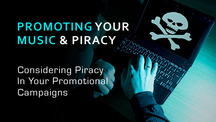The digital age has completely changed the way in which people consume music with this we have seen a massive increase in piracy. In particular there have been two major shifts in culture. The first is that almost all music can now be found online for free (often before it is officially released) and there are many people who are happy to download and share it. The second development is that people no longer want to wait be able to access new music; as soon as something is in the public domain there is demand for it.
With dance music this can take many forms such as a DJ playing it in a club or including it in a mix set, a radio station airing it and even simply uploading it to a Myspace player. In Nic Fanciulli’s Beatportal interview he explains how he asked a DJ in Miami who was playing his new tune where he got it (as Fanciulli had only given it to a handful of people) and the DJ replied that he had ripped it from his Myspace player, despite the quality being extremely low.
These two developments have an impact on the way record labels operate and, more specifically, promote their music. There is a growing trend of record labels waiting until their music is available to buy online until they begin promotional work, in an attempt to try and combat the impact of piracy. But at the same time does promoting in this way have any negative impacts on the traditional model of creating a buzz ahead of release? This article looks at the various pros and cons of when to time your music promotion.
Promoting Ahead of Release – Pros
* Allows time for a buzz and some anticipation to build around your music.
* Provides information for distributors and stores to use when selling your music (both physical and digital) or when pitching for features spots.
* DJs still like to have upfront music which others don’t.
* Increases licensing opportunities for compilations (and similar uses) particularly where there is a requirement for upfront music.
Promoting Ahead of Release – Cons
* More risk of your music being pirated and shared because people want it, but nowhere is selling it.
* Club and radio DJs may have stopped supporting the music by the time of release.
Promoting at the Time of Release – Pros
* Less risk of pirated music being available ahead of the official release date.
* People who want to buy the music can get it immediately rather than being tempted to download an illegal version for free.
* Your music is supported by DJs and radio at the time when people can buy it.
Promoting at the Time of Release – Cons
* No real opportunity for any buzz or anticipation to build up.
* Feature spots on download sites and other opportunities may be harder to access. It will also be harder for physical distributors to pre-sell your music to record shops.
* DJs, licensors, radio shows and other users may prefer to have more exclusive material ahead of release.
In conclusion, there are clearly some conflicting issues between promotion and piracy, and there is a balance to be found in terms of timing promotional activities. This will ultimately depend on the priorities of your record label. How much of an impact does piracy ahead of release have on your label? Is there greater value in building up a buzz around your music and achieving feature spots on download stores than trying to reduce the impacts of piracy? How important is it for you to have DJs and radio playing your music at the time of release?
Some aspects of promotion still need to be carried out several weeks ahead of release, for example sending music to magazines to ensure they receive it in enough time to hit print deadlines. It is now possible, however, to be much more flexible in other areas of promotion and experiment with new strategies. Digital delivery systems can allow you to have feedback from tastemaker DJs and music in the hands of radio DJs within a matter of hours and days.
One solution that can strike a good balance is to begin promoting your music at the time it is available to buy from a specific store which has been offered a period of exclusivity. Doing this means the music is legally available at the time you begin promotional work which can assist in reducing any piracy, but you still have a period of time in which to get it to DJs and radio, collect their feedback and then use that information with distributors, download stores and in your marketing at the time of general release.












